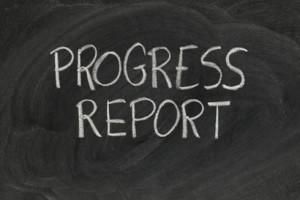How Do You Know What You Know
Have you lost weight? Do you step on the scale, try on your favorite jeans, or ask a friend for her opinion?
What if you want to know how your child is doing at school? Do you use scores on state assessments, report card grades, a communication notebook, or IEP progress reports to help you know how your child is doing at school? All of these sources will give you a snapshot of different aspects of your child’s progress.
You may know that IEP progress reports are feedback from the special education teacher, school therapists, and other school staff that document the progress your child has made on his IEP goals/objectives. But how often should you be receiving these reports?
Look at your child’s IEP document and find the “goals” page(s). There you will find a statement that states how often parents will receive the reports. It will most likely indicate that you’re to receive progress reports at the same time students receive report cards. Little known fact: the frequency of progress reports can be individualized, just like anything else in your child’s IEP. Here are two examples:
• If you child has a behavior goal you may not want to wait until the end of the quarter or semester to know what progress he is making on that particular goal. Ask the IEP team how often the staff looks at data on your child’s behavior goal to decide if he is making sufficient progress. The answer may be every month, every six weeks, etc. If you, as a parent, want to know what school staff know, ask that the IEP reflect that you’ll receive progress reports on the behavior goals every month, six weeks, etc. You want to know what they know, when they know it.
• Your child has a reading goal and you’re comfortable waiting until the end of the quarter to receive the formal progress report; ensure that this is written in the IEP. For each IEP goal you can receive a progress report at different times throughout the year. The report on a behavior goal may come every month, while the progress report on an academic goal may come every quarter. You and the others on the IEP team can decide what’s most appropriate.
Receiving progress reports in a timely way is helpful, but what if the report doesn’t tell you much? What will you know if all you receive on the progress report is a code: PP (Partially Proficient), P (Proficient), NP (No Progress), 1 (Goal Met), 2 (Goal to be Met on Time), or 3 (Goal Not to be Met on Time)? Not much! How can you change this? Talk with the IEP team, discuss the goal of meaningful communication and what that would look like. Major detail: make sure the content of progress reports is described and written in the IEP.
More frequent and meaningful progress reports provide parents with valuable knowledge. Progress reports can be an “insurance” tool that your child’s IEP is being implemented and carefully monitored. An added benefit for teachers: they become more skilled at their craft when they know what’s working and what’s not working, and they can act on this information.
Want to know more? Click here to see this Progress Monitoring resource on my website.
